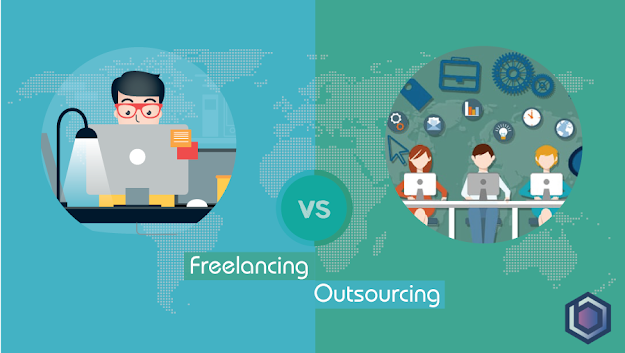The two words freelancing and outsourcing are often wrongly used to indicate a similar meaning. But they actually hold two opposite positions in terms of meaning and functions. Every now and then we see people to use these two words as a synonym for one another because they do not know the meaning or the functions of these two words.
So, let's dive in and explore the difference between these two ideas in details.
1. Etymology:
The word ‘freelancing’ is derived from two different words ‘free’ and ‘lance’. ‘Free’ means ‘independent’ and ‘lance’ means ‘machinery’. So ‘freelancing’ means ‘working independently’.
The word ‘outsourcing’ on the other hand is derived from the words ‘out’ and ‘source’. So, ‘outsourcing’ means ‘getting a source from outside’.
2. Definition:
Freelancing usually means earning money by working independently without any obligation to any entity.
Outsourcing is getting a certain work done by a freelancer by paying him/her without employing them permanently.
3. Relation:
A freelancer gets their task and therefore the payment for completing the task from an outer source (outsource contractor or the marketplace).
An outsource contractor on the other hand provides the task as well as the payment for the completed task to the freelancer.
4. Function:
A freelancer mostly functions as an independent worker. He/She is not obligated to do any work if they don’t want to. He/She can complete the work whenever he/she wants. If he/she submits the finished work within the deadline, he/she will get paid. If he/she doesn’t, he/she won’t receive the payment.
An outsource contractor’s vision is to maximize the utility of the resources he/she/it has by just getting the work done by someone without employing him/her for good. An outsource contractor also can be working as a mediator among the corporate and the freelancers.
5. Payment:
A freelancer gets the payment consistent with his/her tasks. He/She gets payment/remuneration but not a salary.
An outsource contractor pays the freelancers consistent with their tasks. She/he/it doesn't have to pay any salary to the person doing the task.
6. Example:
Let’s say, Rony is a freelance writer. He gets a call from Matt for a task. Matt gives him five topics to write three articles containing at least 800 words in each of them. Matt promises to offer Rony 20 dollar per article. Now, Rony has the freedom to require the work or leave it. This is freelancing.
Matt is the outsource contractor in this case. He is an employee of a company. The company requires some articles for its website. There is no employee who can write efficiently. So, instead of employing another full-time worker, the company hires a freelancer to do the job. So, this outsourcing saves a handsome amount of cash of the corporation.






0 Comments